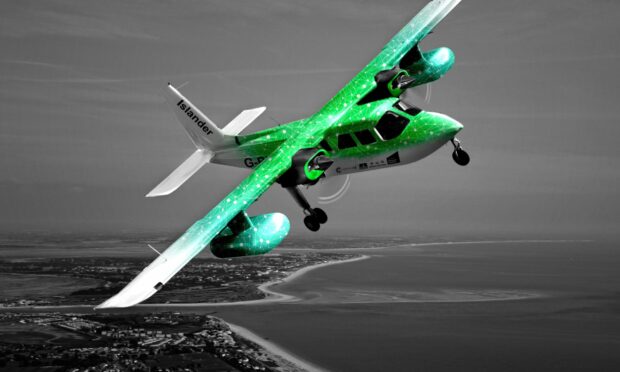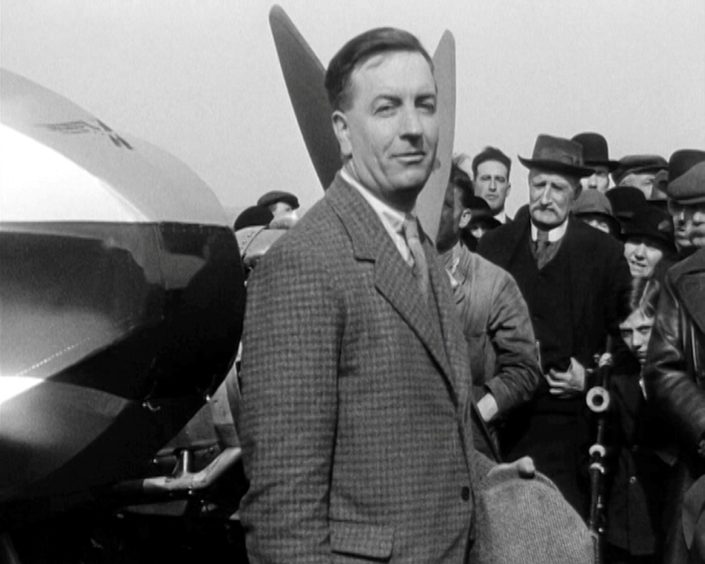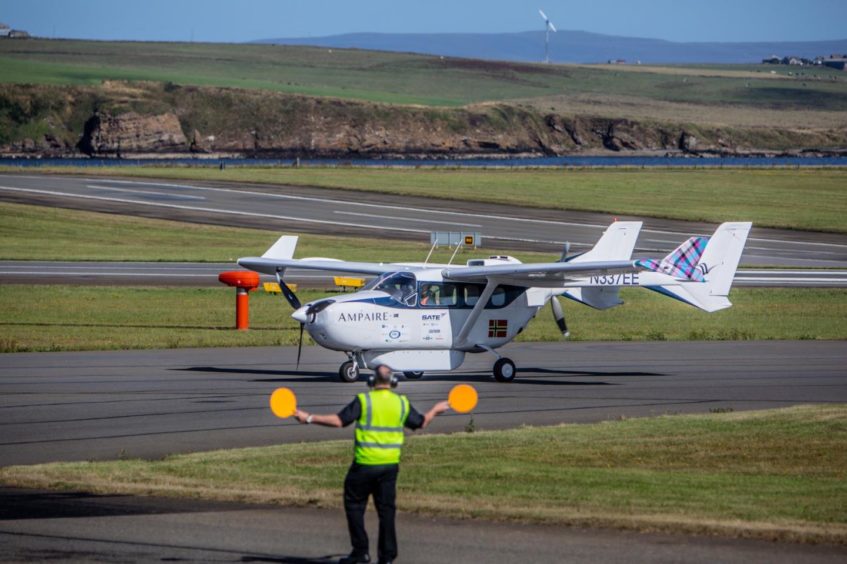Island-hopping air routes in Scotland could become the first in the world with “truly green” passenger services, as the race to decarbonise the airline industry intensifies.
A consortium converting a type of aircraft used daily in Orkney to hydrogen power expects to have it airborne next year, in a multi-million pound project named after a Highland aviation pioneer.
Project Fresson is being backed by the £3.9billion ATI Programme, a research and technology development initiative funded by the UK Government and the aerospace industry.
And it has the support of Scottish airline Loganair, which operates Orkney’s short inter-island routes, regarded as ideal for the introduction of low-carbon airline technology.
Flight trials planned for next year
Led by Cranfield Aerospace Solutions (CAeS), the consortium has turned its attention to hydrogen fuel cell technology after ruling out its original plans to convert a nine-seater Bitten-Norman Islander to hybrid-electric power.
Trials of a hydrogen-powered version of the plane are being planned for late 2022, as part of the researchers’ work to demonstrate its commercial viability.
Jenny Kavanagh, chief strategy officer at CAeS said the project was “pushing on at pace.”
“Once the initial flight trials are done and the safety is proven, we will be looking to fly it elsewhere – Orkney would be great and it’s all possible,” she added.
Project Fresson was named in honour of Captain Ernest Edmund “Ted” Fresson, who established Highland Airways, which introduced the first passenger air services between Inverness, Wick and Kirkwall in the 1930s.
The switch to hydrogen, earlier this year, followed rapid advances in technology in the field and the findings of the research team that its first option would prove too heavy and complex and would not achieve the desired cut in carbon emissions.
Decision to use hydrogen was ‘no brainer’
Ms Kavanagh said that, although it was a difficult decision at the time, it was a “no brainer.”
She added: “Hydrogen fuel cells have zero emissions, no battery charge and turnaround time is comparable to that of conventional fuels.
“It is less complicated and operational costs and the fuel costs are significantly lower.
“With all the renewable power and hydrogen work that’s going on in the Orkney islands, it was pretty obvious what direction we needed to go.”
Ms Kavanagh continued: “We are speaking to Loganair, who are supporting the project.
“We have to speak to operators because we want to get this thing into passenger service.
This isn’t just about proving physics – it has to be commercially viable and, to be commercially viable we have to understand what that means, because we are not an operator.
“We are also speaking to a lot of other operators as well, because everybody’s operations are different.”
Air services operated on behalf of Orkney Islands Council by Loganair link Kirkwall with six small island airports to the north, including Stronsay, Sanday, North Ronaldsay and Eday.
Among them is the 1.7-mile hop between Westray and Papa Westray, which holds the world record as the shortest scheduled passenger flight, lasting between 53 seconds and a minute-and-a-half.
Loganair had hoped to claim a global first with CAeS by introducing the hybrid-electric powered Islander on routes there by this year.
The airline’s chief executive described Orkney as a “fantastic place” to introduce the technology because the islands are well known for the leading role they have taken in renewable energy and embracing new developments in the sector
As well as Bedfordshire-based CAeS and Britten-Norman, the Project Fresson consortium includes Ricardo UK and Innovatus Technologies.
More important than a ‘moment of glory’
With other companies working on similar projects, Ms Kavanagh said there was a strong competitive element.
She added: “We obviously do believe we can be first, but being first can have its disadvantages.
“It’s more expensive to start with, and you solve all the problems for everyone, just for a moment of glory.
To be honest, it’s more about the urgency required in the industry and the sooner we can get hydrogen solutions into passenger carrying service, the sooner momentum can start to build.
“What that means is that the regulations have been sorted out for those sized aircraft.
“It’s a starting point, because aviation has to decarbonise. That’s what the urgency to get these things into passenger service is about.
“It would be great to be first – but event if we are second, so what?”
Last week a six-seat hybrid-electric aircraft flew from Orkney across the Pentland Firth in what was a first demonstration of the technology in the UK.
The trial was part of the Sustainable Aviation Test Environment (Sate) project, led by Highlands and Islands Airports (Hial) and based at Kirkwall Airport.
The initiative was created to test low-carbon aviation technologies as well as investigate the airport infrastructure necessary to support sustainable aviation.


